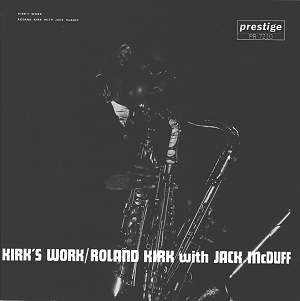1. Three for Dizzy
2. Makin’ Whoopee
3. Funk Undrrneath
4. Kirk’s Work
5. Doin’ the Sixty-Eight
6. Too Late Now
7. Skater’s Waltz
Roland
Kirk – Tenor sax, manzello, stritch, flute,
siren
Jack
McDuff – Hammond organ
Joe
Benjamin – Bass
Arthur
Taylor – Drums
Don’t
play the fool if you want to be taken seriously.
Someone once said that to me and I wisely
ignored the advice. Roland Kirk would have
ignored it too. Some critics never took him
seriously because he often fooled about and
even played three reed instruments at once.
You might expect this sort of showmanship
from a one-man band on a seaside pier or a
contestant in some weird talent show but surely
not from a serious jazz musician! Yet Roland
Kirk was serious about his music – and you
can seriously regard him as three or four
extremely talented jazz players. He was a
tenor-saxist but he also played the flute,
plus two strange instruments which he claimed
to have found in the basement of a music shop
– the manzello and the stritch. In fact at
various times he played about a dozen different
instruments and invented several more.
This
album supplies ample evidence of his virtuosity
on all four main instruments. Recorded in
1961, this was one of Roland’s early albums
and it stands up many years later for the
superb imagination and inventiveness of his
playing. Four of the seven tunes are Kirk’s
compositions, starting with Three for Dizzy
which begins with Roland supplying what sounds
like a whole saxophone section behind Jack
McDuff’s powerful Hammond organ. McDuff’s
bluesy solo is followed by Kirk soloing on
tenor with a relaxed feel reminiscent of Lester
Young. Joe Benjamin's bass lays down a solid
line and Art Taylor's drums add suitable punctuations.
Makin’
Whoopee is the first jazz standard on
the CD and has Kirk soloing fluently on tenor
sax and manzello. For Funk Underneath,
a slowish loping blues, Kirk switches to the
flute. His flute-playing influenced many subsequent
jazz flautists with its broad range from mellowness
to edginess - and the vocal effects which
seemed to let him speak through the instrument.
For the title-track (another Kirk original),
Roland reverts to the tenor sax and then the
manzello, blowing hard and bluesily in a style
he must have perfected in his earlier years
playing with rhythm-and-blues groups. By comparison,
McDuff's organ solo sounds restrained. Doin'
the Sixty-Eight starts with Kirk on multiple
reeds and then develops into fairly laid-back
playing on tenor and manzello (one at a time!).
Too
Late Now shows Roland's tender side, backed
by warm chords from the Hammond organ. He
goes into double time for a chorus on manzello,
but returns to the tenor and the slower tempo
for the closing half-chorus. The album ends
with a playful interpretation of Waldteufel's
Skater's Waltz, swinging like crazy
on tenor, then stritch, then both.
With
a playing time of just over 33 minutes, this
CD may seem niggardly but Roland Kirk's work
contains twice as much input as that of most
other players. This album proves that Roland
was no fool, but a significant musician who
deserves not to be underestimated.
Tony Augarde
